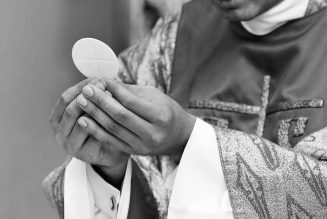6th Sunday of Easter
By Fr. Victor Feltes
At the Last Supper, Jesus told his apostles, “I have called you friends…” He calls them friends and he does not lie; what Jesus speaks is true. And then he tells them, “You are my friends if you do what I command you.” But what if we, or they, do not do what Christ commands? Does the Lord remain a friend towards us even when we are not being a friend towards him?
It appears Judas Iscariot was not at the table with the other apostles when Jesus spoke those words. Sometime after Jesus had kneeled down and washed their feet, Judas went out into the night to arrange for his betrayal. The passages we hear at Mass from St. John’s Gospel today are set two chapters after that. Jesus foresaw that Judas would freely choose to betray him, and God would go on to work great good from that betrayal, but these facts make the grave sin of Judas no less wrong. Later that night, in the dim light of the Garden of Gethsemane, Judas singled-out his rabbi for the arresting soldiers through a greeting and a kiss. Revealingly, St. Matthew records Jesus’ reply to Judas: “Friend, do what you have come for.” Even as Judas was betraying him, Jesus calls him “Friend.”
Jesus declares “no one has greater love than this, than to lay down one’s life for one’s friends.” And that is what Jesus did for us and the whole world. St. Paul writes in his Letter to the Romans how this proves the Lord’s love for us: “Indeed, only with difficulty does one die for a just person, though perhaps for a good person one might even find courage to die. But God proves his love for us in that while we were still sinners Christ died for us.” St. John agrees in our second reading that “in this way the love of God was revealed to us: God sent his only Son into the world so that we might have life through him. In this is love: not that we have loved God, but that he loved us and sent his Son as expiation for our sins.”
Like the Good Samaritan towards the robbers’ victim, Jesus Christ loved us before we had done anything to merit his love. But one might ask, “Does his love for us remain the same now?” Yes, for the Letter to the Hebrews says, “Jesus Christ is the same yesterday, today, and forever.” If we wander, he is like the father in the Parable of the Prodigal Son waiting and longing for our return. Like a mother hen, he yearns to gather us together under wing. And whenever our Good Shepherd can carry home one lost sheep to his fold, he rejoices greatly with all of Heaven. In light of this divine love for us, how should we respond?
Jesus told his disciples to “remain in my love. … If you love me, you will keep my commandments. … If you keep my commandments, you will remain in my love…” So first, we must to recognize and receive the incredible love he always has for us. Then, remaining in that love, we love him in return. This mutual love inspires how we act towards him and other people. And through living this beautiful way of life we remain in his love. Jesus says, “If you love me, you will keep my commandments.” Jesus teaches the greatest commandments are for us to love God with our whole selves and love our neighbors as ourselves. “This I command you: love one another. … As I have loved you, so you also should love one another.”
The Church Father St. Jerome records how when St. John the Evangelist lived at Ephesus that apostle became unable to walk due to extreme old age. His disciples carried him in their arms with difficulty into the church. He could not muster the breath to preach many words. He would simply say to the congregation, week after week, “Little children, love one another.” Over time, his hearers became annoyed from hearing the same message over and over. They asked, “Master, why do you always repeat the same exhortation?” John answered, “Because it is the Lord’s command, and if this be done all is done.” As St. John wrote his New Testament letter: “Beloved, let us love one another, because love is of God [and] God is love.”
Jesus Christ is always a loving friend toward you, so be his faithfully loving friend in return, and a true friend toward all others, willing their greatest good.









